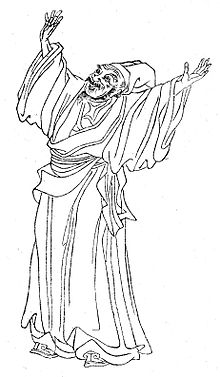Liu Zongyuan
Liu Zongyuan (柳宗元, Pinyin: Liǔ Zōngyuán, Wade-Giles: Liu Tsung-yüan; * 773 , † 819 ) was a reform Confucian official scholar of the late Tang Dynasty .
Life
Liu Zongyuan excelled in the exam and became district commander of Lantian near the capital Chang'an in 801. In 803 he became an investigator in the capital's censorship.
Towards the end of the reign of the Emperor Dezong , there was criticism of the growing power of the emperor's favorites, among whom there were a particularly large number of eunuchs. At the turn of the century, a group of reformers formed, led by Wang Shuwen and Wang Pi. In addition to Liu Yuxi , Liu Zongyuan was also a supporter of the demand for administrative reform to bring about an end to what was perceived as favoritism. The death of Emperor Dezong and the accession of Shunzong to the throne led the reform movement almost to success. But the new emperor was already marked by illness and died after eight months in government. His son, Emperor Xianzong , dismissed the reformers from their offices and banished them from the capital Chang'an .
plant
Liu Zongyuan lived in Yongzhou (永州) for almost the rest of his life. There he dealt with the writing of poems, which are counted among the most important of Tang literature. His writings show the tendency of Buddhism-critical reform Confucianism, to which a few other representatives adhered during his lifetime. The experience of the natural beauty far from the capital and the experience of the difficult living conditions of the farmers were important.
Liu Zongyuan is one of the eight great prose masters of the Tang and Song times. About 500 of his style-forming texts are known.
His instructive fables and satirical parables on political cruelty and social need include L.
- " Treatise on the snake catcher" («捕 蛇 者 說» Bǔ Shézhě Shuō)
- " The donkey of Qian " («黔 之 驢» Qián zhī Lǘ)
- Through his " Eight Notes from Yongzhou " ("永州 八 記" Yǒng zhōu Bā Jì), Liu is considered the founder of the travelogue depicting landscape in China.
The four-line poem River in the Snow («江雪» Jiāngxuě) is one of the most famous and most translated poems in Chinese literature.
- 千山 鳥飛 絕 Qiān shān niǎo fēi jué,
- 萬 徑 人 蹤 滅 wàn jìng rén zōng miè.
- 孤舟 蓑笠 翁 Gū zhōu suō lì wēng,
- 獨 釣 寒江 雪 dú diào hán jiāng xuě.
- Birds fly over a thousand mountains
- the trail of people blows on all roads.
- Alone in the boat, with a bast cape and bamboo hat
- An old man fishes in the snow from the cold tide.
literature
- Liu Zongyuan: At the foolish brook. Prose and poetry. From the Chin. by Raffael Keller, with the assistance of Jürgen Theobaldy . Berlin 2005, ISBN 3-932109-45-7 .
- Rainer Hoffmann, Qiuhua Hu: China. Its history from the beginning to the end of the imperial era. Freiburg 2007. ISBN 978-3-7930-9499-9
- Raffael Keller: The faithful interpretation: Approaches to a methodology for the translation of classical Chinese poetry using the example of Liu Zongyuan's quatrain Jiangxue . In: Asian Studies. Volume 55, No. 4, 2001, doi: 10.5169 / seals-147554 , p. 987.
- Volker Klöpsch, Eva Müller (ed.): Lexicon of Chinese Literature. Munich: C. Beck, 2007, ISBN 978-3-406-52214-7 .
Individual evidence
| personal data | |
|---|---|
| SURNAME | Liu Zongyuan |
| BRIEF DESCRIPTION | political advisor to Emperor Sui Wendi |
| DATE OF BIRTH | 773 |
| DATE OF DEATH | 819 |

